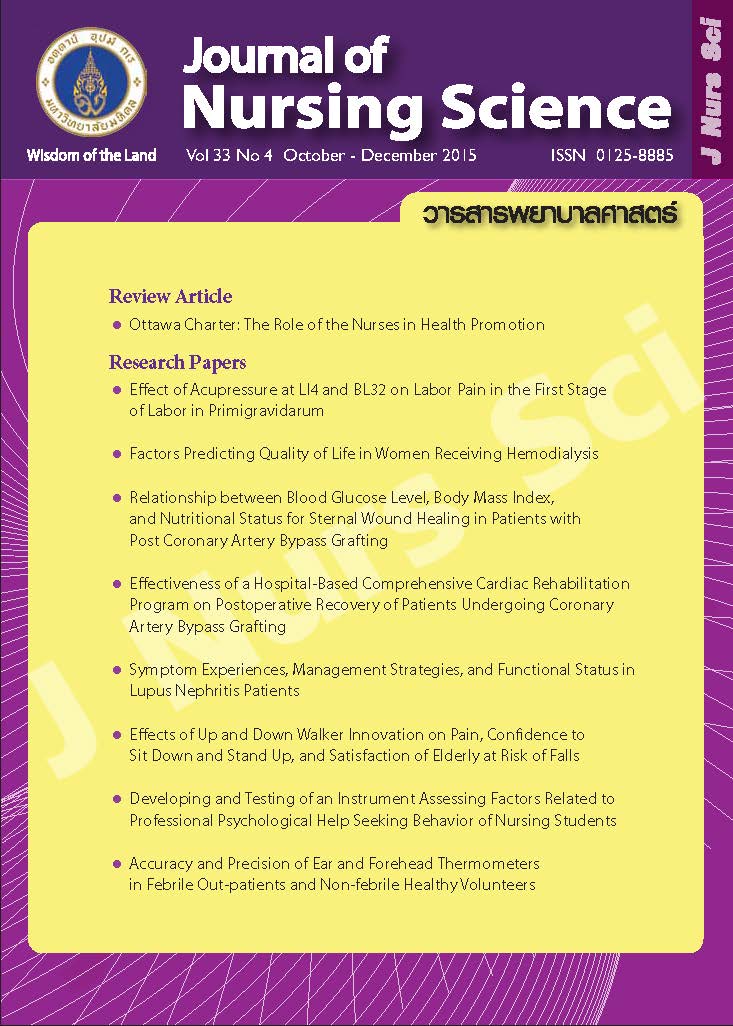Developing and Testing of an Instrument Assessing Factors Related to Professional Psychological Help Seeking Behavior of Nursing Students
Main Article Content
Abstract
Purpose: This study aimed to develop and test the quality of a developed questionnaire based on the theory of planned behavior to measure factors related to professional psychological help seeking behavior of nursing students.
Design: This study was a methodological study.
Methods: This study consisted of 2 phases, developing a questionnaire and testing the quality of the questionnaire. The subjects were 1st- 4th nursing students in academic year 2013 from one Faculty of Nursing, Bangkok who screened with the Depression Anxiety Stress Scale questionnaire and had a least 1 aspart of the questionnaire above normal level. Phase 1, 100 subjects completed the open-ended questionnaire for analysing salient beliefs related to attitudes toward behavior, subjective norm, and perceived behavioral control to develop a questionnaire. Content analysis was used for this phase. Phase 2, 70 subjects answered the developed questionnaire. Item analysis with t-test between the high and the low score groups and internal consistency were performed.
Main findings: The results found that there were 41 items from 50 items indicated statistic significantly. The questionnaire, a rating scale with 2 poles and 7 point scale, consisted of 19 items for measuring attitude variable, 11 items for measuring subjective norm, 8 items for measuring behavioral control, and 3 items for measuring intention. The reliabilities with Cronbach’s alpha coefficient of each aspect were between .65 - .96
Conclusion and recommendations: This study provided evidence of developing a questionnaire based on the theory of planned behavior for measuring factors related to seek such help. However, this questionnaire in a new measurement for nursing student context. Before using this questionnaire, nurse educators and mental health professionals should repeat testing the quality of the questionnaire.
การสร้างและทดสอบเครื่องมือประเมินปัจจัยที่เกี่ยวข้องกับพฤติกรรมการแสวงหาการช่วยเหลือทางจิตใจ จากบุคลากรทางสุขภาพจิตของนักศึกษาพยาบาล
บทคัดย่อ
วัตถุประสงค์: เพื่อสร้างและทดสอบคุณภาพของเครื่องมือประเมินปัจจัยที่เกี่ยวข้องกับพฤติกรรมการแสวงหาการช่วยเหลือทางจิตใจจากบุคลากรทางสุขภาพจิตของนักศึกษาพยาบาล ซึ่งสร้างขึ้นตามแนวคิดทฤษฎีการวางแผนพฤติกรรม
รูปแบบการวิจัย: การพัฒนาเครื่องมือ
วิธีดำเนินการวิจัย: แบ่งออกเป็น 2 ระยะ คือ ระยะพัฒนาเครื่องมือ และระยะทดสอบคุณภาพเครื่องมือกลุ่มตัวอย่างเป็นนักศึกษาชั้นปีที่ 1-4 ของคณะพยาบาลศาสตร์ มหาวิทยาลัยแห่งหนึ่งในกรุงเทพมหานคร ที่มีระดับคะแนนจากการคัดกรองด้วยแบบประเมินความทุกข์ทางจิตใจ ความเครียด ซึมเศร้าและวิตกกังวลอย่างน้อย 1 ด้านสูงกว่าปกติ ระยะที่ 1 กลุ่มตัวอย่างจำนวน 100 คน ตอบแบบสอบถามปลายเปิดเพื่อวิเคราะห์ความเชื่อเกี่ยวข้องกับบททัศนคติต่อพฤติกรรม การคล้อยตามกลุ่มอ้างอิง และการรับรู้ในการควบคุมพฤติกรรมในการนำไปสร้างแบบสอบถาม ระยะนี้วิเคราะห์ข้อมูล โดยใช้การวิเคราะห์เนื้อหา ระยะที่ 2 กลุ่มตัวอย่างจำนวน 70 คน ตอบแบบสอบถามที่สร้างขึ้น นำข้อมูลที่ได้มาตรวจสอบคุณภาพของเครื่องมือด้วยการหาอำนาจจำแนกจากความแตกต่างของตัวแปรระหว่างกลุ่ม คะแนนสูง และกลุ่มคะแนนต่ำโดยใช้สถิติ t-test และวิเคราะห์หาความเชื่อมั่นของแบบสอบถามด้วยการทดสอบสัมประสิทธิ์แอลฟ่าของครอนบาค
ผลการวิจัย : พบว่า แบบสอบถามที่สร้างขึ้นนี้ จำนวน 50 มี ข้อคำถามที่ใช้ได้จำนวน 41 ข้อ ลักษณะคำตอบเป็นมาตรวัดแบบ 2 ขั้วแบ่งเป็น 7 ระดับ ประกอบด้วยข้อคำถามความตั้งใจในการทำพฤติกรรมจำนวน 3 ข้อ ทัศนคติต่อพฤติกรรมจำนวน 19 ข้อ การคล้อยตามกลุ่มอ้างอิงจำนวน 11 ข้อ และการรับรู้ในการควบคุมพฤติกรรมจำนวน 8 ข้อ ความเชื่อมั่นขอแบบสอบถามอยู่ระหว่าง .65 - .96
สรุปและข้อเสนอแนะ: การศึกษาครั้งนี้เป็นหลักฐานในการนำทฤษฎีการวางแผนพฤติกรรมมาใช้สร้างแบบสอบถามในการประเมินปัจจัยที่เกี่ยวข้องกับ การแสวงหาการช่วยเหลือทางจิตใจจากบุคลากรทางสุขภาพจิตอย่างไรก็ ตามแบบสอบถามนี้เป็นเครื่องมือใหม่ในบริบทของนักศึกษาพยาบาล อาจารย์และบุคคลากรทางสุขภาพจิต ควรได้มีการทดสอบคุณภาพของเครื่องมือซาํ้ ก่อนนำไปใช้
คำสำคัญ: การสร้างแบบสอบถาม แบบวัดปัจจัยที่เกี่ยวข้องกับพฤติกรรมการแสวงหาการช่วยเหลือทางจิตใจ ทฤษฎีการวางแผนพฤติกรรม นักศึกษาพยาบาล
Article Details
Copyright Notice: Nursing Science Journal of Thailand has exclusive rights to publish and distribute the manuscript and all contents therein. Without the journal’s permission, the dissemination of the manuscript in another journal or online, and the reproduction of the manuscript for non-educational purpose are prohibited.

Disclaimer: The opinion expressed and figures provided in this journal, NSJT, are the sole responsibility of the authors. The editorial board bears no responsibility in this regard.


